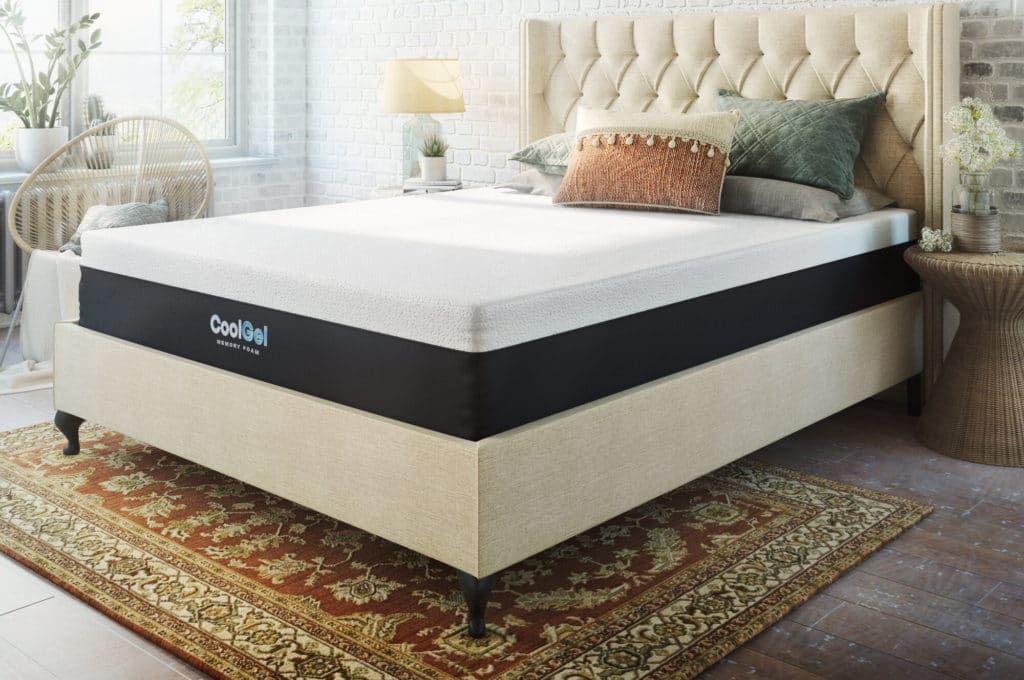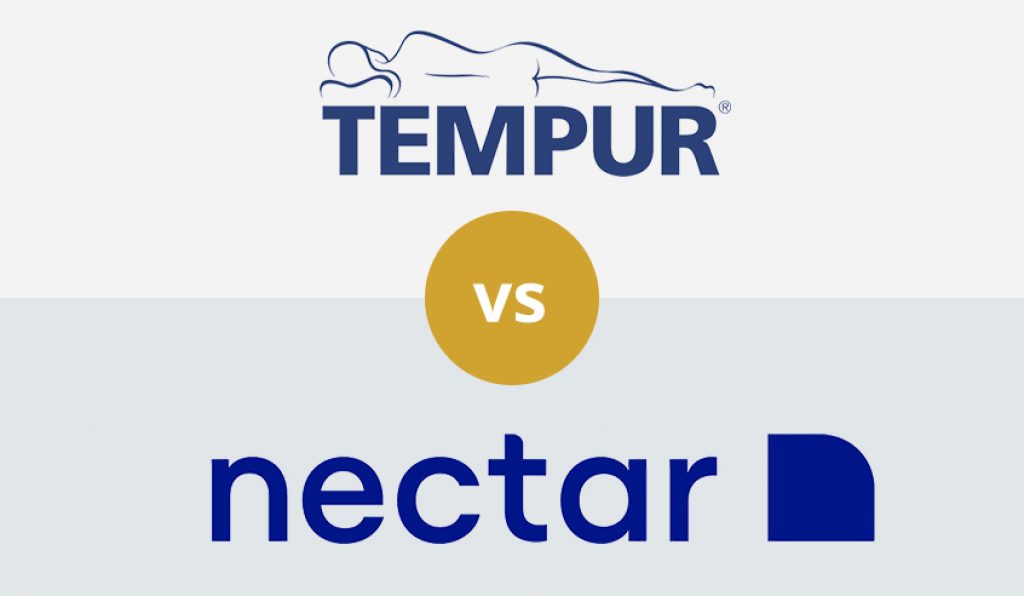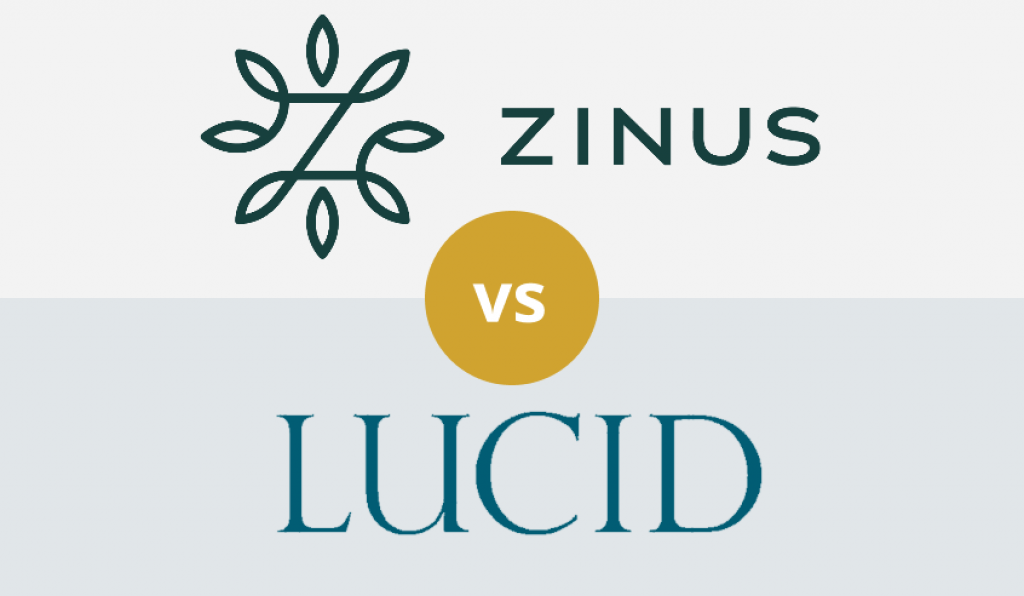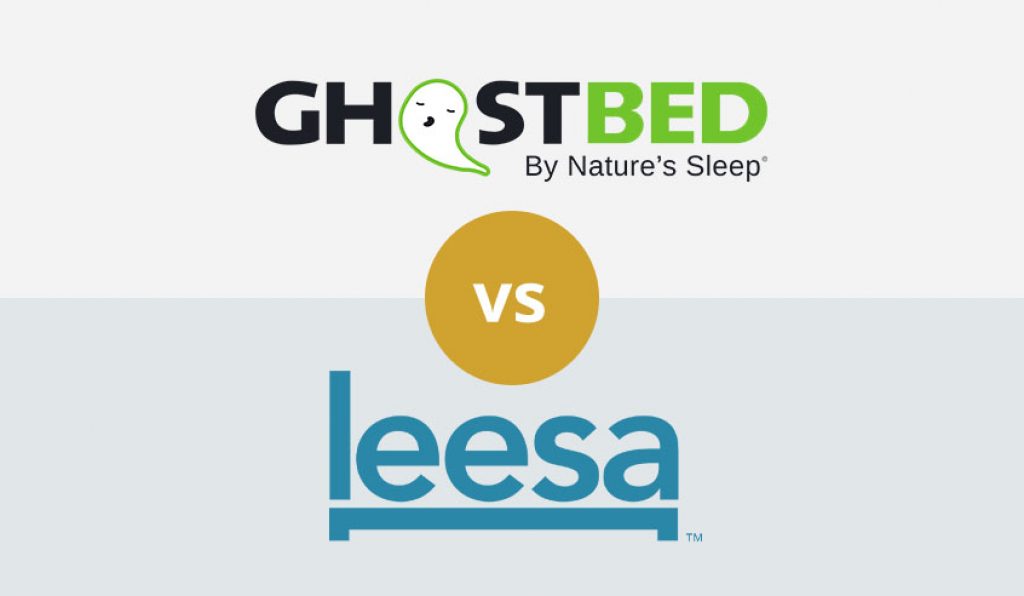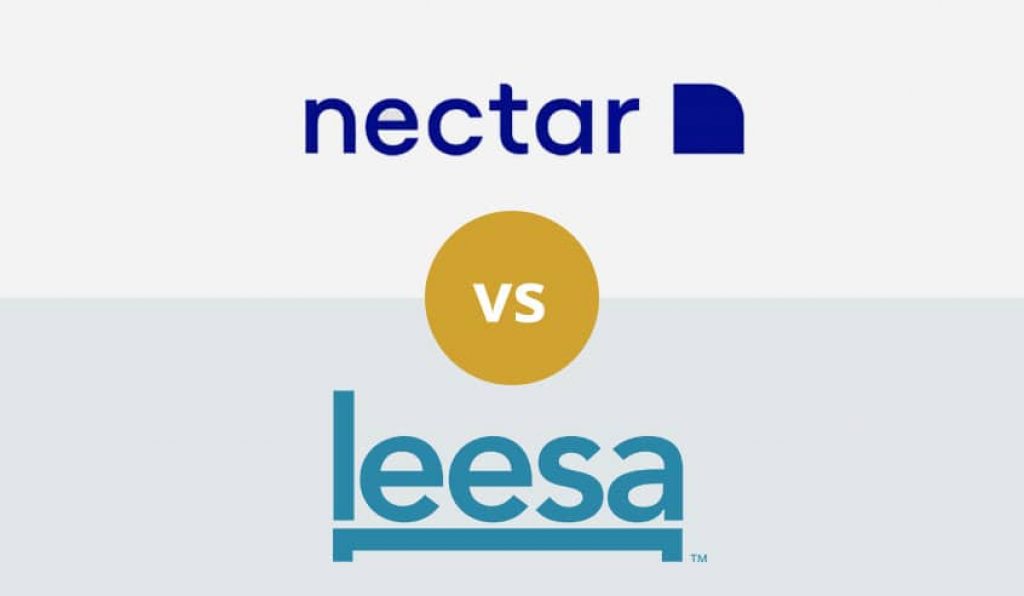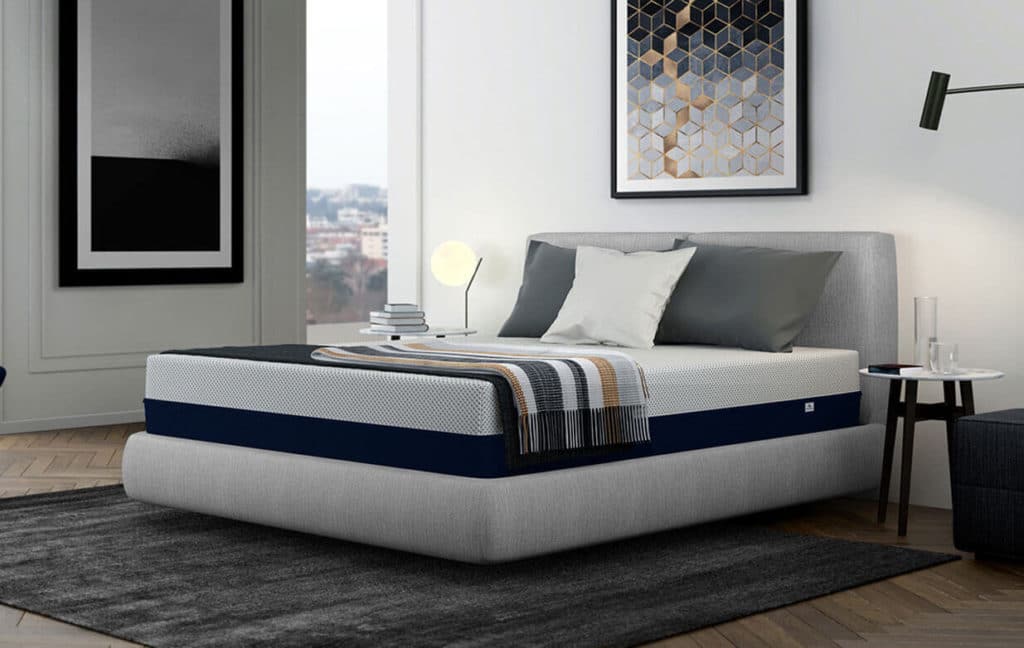

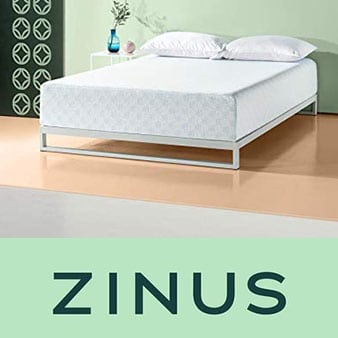
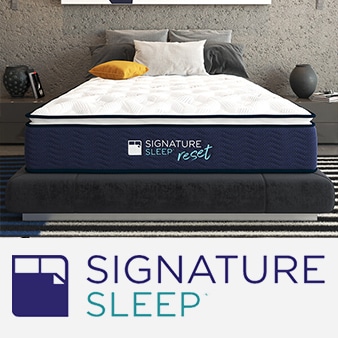
If you’re looking to get a better night’s sleep from your mattress, you’ve probably come across the Zinus and Signature Sleep mattresses. These two foam beds both promise excellent sleep with no waking up or rolling around in the middle of the night. But, which bed is better for you? We’ll compare the Zinus vs. Signature Sleep mattresses head-to-head to help you figure out which one is right for your sleeping style. Overall, the Zinus is best for side and back sleepers, while the Signature Sleep is best for stomach sleepers who prefer a firm surface during the night.
The Zinus and Signature Sleep mattress stand out from the wealth of mattresses on the market because of their affordable pricing. Both of these beds are hundreds of dollars cheaper than many other, comparable foam mattresses, which takes a lot of the stress out of the decision of choosing a new mattress.
Still, you want to make sure you’re getting the better of these two beds for your sleeping style. Both the Zinus and Signature Sleep mattresses are made entirely from foam. But, the types and layers of foam differ quite a bit. The Zinus mattress comes with both memory foam, which conforms to your body, and comfort foam that offers support without losing its shape. It’s also worth noting that the memory foam in the Zinus mattress is infused with gel, which helps keep you cooler throughout the night. The Signature Sleep mattress, on the other hand, only has a layer of standard memory foam.
This difference in construction plays an important role in determining how the beds feel. The Signature Sleep mattress is relatively firm, so it tends to be preferred by stomach sleepers and some back sleepers. The Zinus mattress is a bit softer (although still firm relative to many other foam mattresses), so it’s favored by back sleepers and heavier side sleepers who can sink into the foam.
Another important thing to note about these two mattresses is that the Zinus comes with a 100-night sleep trial. That means you can try it out for 100 nights and then return it if you don’t love it. The Signature Sleep mattress, on the other hand, doesn’t offer a return period in case you don’t end up loving the bed. Both mattresses come with 10-year warranties to protect against any defects or sagging in the foam over time.
| Zinus | Signature Sleep |
|
|
| VIEW ON AMAZON | VIEW ON AMAZON |
| Zinus | Signature Sleep | |
| Type | Foam | Foam |
| Firmness | Medium firm | Firm |
| Thickness | 10″ | 10″ |
| Weight (Queen) | 51.5 lbs | 53.5 lbs |
| Sleep trial | 100 nights | N/A |
| Warranty | 10 years | 10 years |
| Price (Queen) | $201.64 | $222.99 |
| Certification | CertiPUR-US | CertiPUR-US |
| Zinus | Signature Sleep | |
| Support core | 5.5″ high-density foam | 8″ high-density foam |
| Comfort layers | 2.5″ comfort foam2″ gel-infused memory foam | 2″ memory foam |
| Cover | Knitted Jacuard | Knitted polyester |
At first glance, the construction of the Zinus and Signature Sleep mattresses looks very similar. Both of the beds are 10 inches tall, and both are made entirely of foam. On top of that, both mattresses have a two-inch layer of memory foam on top of the bed.
But look more closely, and you’ll see that these two mattresses actually take very different approaches to providing you with a good night’s rest. The memory foam layer on the Zinus mattress sits on top of another 2.5-inch layer of comfort foam, which won’t give like memory foam but is much softer than the high-density foam used in the mattress base. That essentially offers a transitional layer of foam that eases the firmness of the bed. The presence of this foam layer is a big reason why the Zinus mattress is rated medium firm rather than firm.
The Signature Sleep mattress, on the other hand, has just an eight-inch layer of high-density foam beneath the top memory foam layer. That means that your body is very likely to come into contact with this dense foam as you sink into the bed. This may be fine for back and stomach sleepers who prefer a hard feel, but it can also create uncomfortable pressure points for many side sleepers.
The two mattresses come with knitted covers. Both are made from synthetic materials that are cool to the touch, but are not infused with anything to aid in your sleep.
Ultimately, the biggest question you face in choosing between the Zinus vs. Signature Sleep mattress is which one will be more comfortable for you. To help answer that question, we’ll compare these two beds head-to-head in a number of categories that affect the quality of your sleep.
As we noted above, the difference in foam layers between these two mattresses leads to very different firmness and support levels.
The Zinus is described as medium firm thanks to the presence of the comfort foam layer. You can expect to sink a few inches into the bed on the memory foam, but then be cushioned and supported before you sink all the way to the high-density foam base. That’s an advantage for back and side sleepers in particular, since it prevents the formation of pressure points while still allowing for the natural contour of your body. Heavyset back sleepers and all stomach sleepers, however, might find that this mattress feels too soft for comfort.
The Signature Sleep mattress is much more firm since you immediately sink through the thin memory foam layer and onto the high-density foam base of the mattress. Because of this construction, don’t expect the mattress to fill in around the natural curvature of your neck and back the way you might with a more plushly padded bed. The Signature Sleep mattress is generally favored by stomach sleepers and heavier back sleepers, who will sink in more than lighter sleepers. Side sleepers should avoid the Signature Sleep mattress entirely, since it’s very likely to cause pressure points.
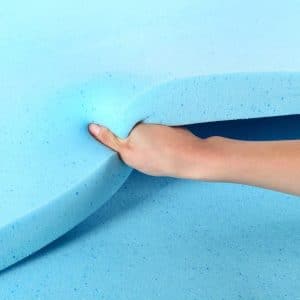
Zinus’ memory foam top is infused with green tea extract and cooling gel. The gel can diminish the lifespan of the mattress by reducing the longevity of the foam, but this isn’t a big deal since the bed comes with a 10-year warranty. More important, it prevents you from overheating and rolling around in the middle of the night by encouraging the dissipation of heat away from your body.
The Signature Sleep bed, on the other hand, uses traditional memory foam. This type of memory foam is infamous for trapping heat. Many people who sleep warm can find themselves waking up in a sweat in the middle of the night. So, the Signature Sleep may not be the best option if you live in a hot climate.
Since both of these mattresses are made entirely from foam, they each do a very good job limiting motion transfer across the bed. The Zinus mattress is slightly better in this respect thanks to the dampening offered by the comfort foam layer. However, it’s unlikely you’ll notice a partner moving around during the night on either of these mattresses.
When it comes to responsiveness, the firmer Signature Sleep mattress has a clear edge. The key is that traditional memory foam tends to bounce back to its original shape much faster than gel-infused memory foam. It also lasts longer before developing permanent indentations and sags. So, you should see the foam snap back after laying down or moving around in the mattress much faster on the Signature Sleep bed compared to the Zinus bed.
The Signature Sleep mattress also offers better bounce than the Zinus mattress. It should be noted that neither bed stands out in this category, in part thanks to the all-foam construction. If you jump into either the Zinus or Signature Sleep mattresses, you’re more likely to stick and sink slightly than to bounce back.
That said, in the Signature Sleep mattress, the high-density foam layer is nearer the surface of the bed. You can use this as a layer to press against to lift yourself out of the bed or to bounce around. In the Zinus mattress, you can become somewhat mired down in all the foam when trying to lift yourself out of the bed because of the action of the comfort foam layer.
The edge support on the Signature Sleep and Zinus mattresses is pretty comparable. Both mattresses can hold your weight while sitting without sagging too much. For heavier users, the Signature Sleep mattress may offer slightly better edge support, since you’ll be weighting the high-density foam layer rather than the comfort foam layer as on the Zinus bed.
All foam mattresses need to inflate before they’re ready to be slept on. Both Zinus and Signature Sleep recommend waiting 48 hours for your bed to fully inflate. But, customers have noted that each of these beds is ready almost immediately after you take them out of their respective boxes. Inflation time is essentially just a few minutes, and there is no detectable chemical smell unless you have a very sensitive nose.
| SLEEP POSITION | Light sleepers(less than 130 lbs) | Average sleepers(130 lbs to 230 lbs) | Heavy sleepers(greater than 230 lbs) |
| Zinus | |||
| Side | good | good | very good |
| Back | very good | very good | good |
| Stomach | good | good | fair |
| Signature Sleep | |||
| Side | fair | fair | fair |
| Back | good | good | good |
| Stomach | good | fair | fair |
The Zinus mattress is described as medium firm and contours closely to the shape of your body thanks to the comfort foam layer. As a result, it is generally preferred by back sleepers who need support around the curvature of their spine. At the same time, heavyset side sleepers might feel that the mattress is soft enough that they don’t develop pressure points. Light and average-weight stomach sleepers will feel like the mattress is more firm, and so they may also like the feel of the Zinus bed.
The Signature Sleep mattress is much more firm, so it’s mostly limited to use by back and stomach sleepers. Side sleepers are very likely to notice pressure points with this bed. Even then, heavier stomach sleepers may think that the bed is not firm enough because of the memory foam – that can feel a bit suffocating when you’re lying face-down in the mattress.
| SIZE | Zinus | Signature Sleep |
| Twin | $390 | $165 |
| Full | $260 | $215 |
| Queen | $201 | $223 |
| King | $279 | $315 |
| Sleep trial | Warranty and refund | Delivery | |
| Zinus | 100 days | 10-year limited warrantyFull refund | Within the U.S. |
| Signature Sleep | N/A | 10-year limited warrantyFull refund within 2 years | Within the U.S. and Canada |
One of the major differences between the Zinus and Signature Sleep beds is that Zinus offers a 100-night sleep trial. That gives you peace of mind that you can try out the mattress risk-free for 100 nights. With the Signature Sleep mattress, you’re truly committing to the bed when you purchase it.
The warranties also differ. Both offer 10-year coverage against defects in the foam or unwarranted sagging. But, Signature Sleep’s refund is prorated after the first two years, meaning that you won’t get back the full price you paid for the mattress. Zinus, on the other hand, will give you a full refund if there are problems with your bed at any point during the 10-year warranty period.
Finally, it’s important to consider where Zinus and Signature Sleep deliver. Both companies will send mattresses anywhere in the continental US, but only Signature Sleep sends mattresses to Canada as well.
Pros
Cons
Pros
Cons
Ultimately, which mattress is better for you comes down to your sleeping style. The Zinus mattress is better for back sleepers who prefer medium firmness and heavyset side sleepers. The Signature Sleep mattress is better suited for back sleepers who prefer a very firm bed without transitional foam layers.
If you’re comparing the Signature Sleep vs. Zinus beds on features alone, rather than sleeping style, it’s hard not to prefer the Zinus bed. The gel-infused memory foam offers better temperature regulation throughout the night compared to traditional memory foam. It also comes with a full 10-year warranty and a 100-night sleep trial. Finally, the Zinus bed is cheaper than the Signature Sleep mattress for queen- and king-sized beds.
